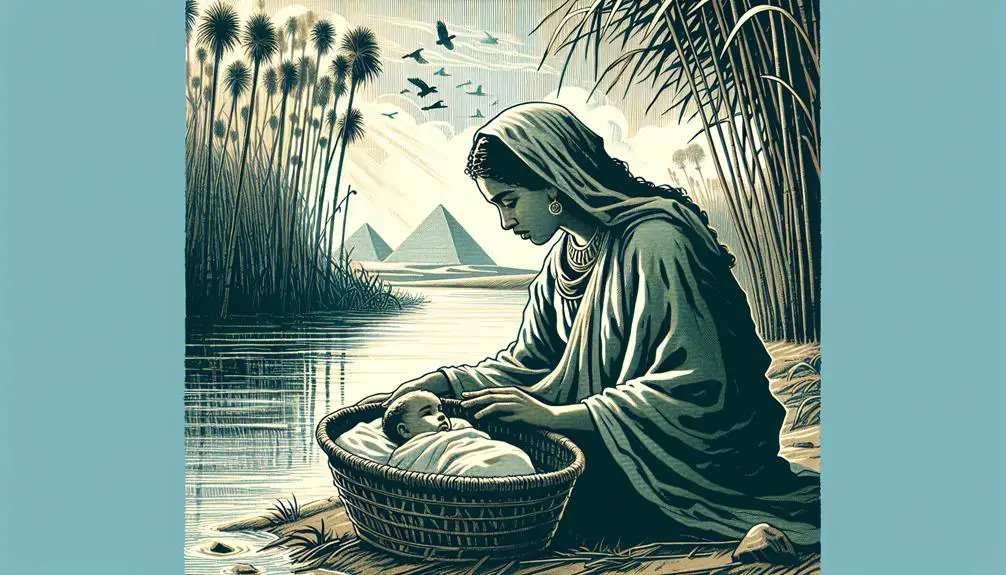Yielding strength and wisdom, biblical mothers guide us in faith and resilience; discover how their stories resonate today.

Faithful Mothers in the Bible
In an era where being a mother means juggling work, kids, and occasionally, turning water into wine, the mothers in the Bible seem to have set the bar impossibly high.
You've got Sarah laughing off the very idea of motherhood in her golden years, Jochebed crafting a baby basket fit for Pharaoh's river, and Mary, facing an angel with a message that would terrify the bravest of souls, with nothing but grace.
These stories aren't just ancient history; they're lessons in faith, perseverance, and, above all, love. But how do these timeless tales translate to your life today?
Stick around, and you might find these biblical mothers have more in common with you than you think.
Key Takeaways
- Faithful mothers in the Bible often overcame barrenness through divine intervention and unwavering faith.
- Maternal figures displayed immense courage and sacrifice, sometimes defying authority for their children's protection.
- Submission to God's will and understanding of one's divine role were crucial traits among biblical mothers.
- Loyalty, love, and the ability to adapt culturally were significant in forming enduring legacies and relationships.
Sarah: Mother of Nations

Sarah, the matriarch of the Abrahamic religions, holds a pivotal role as the mother of nations, embodying both the struggles and triumphs inherent in this title. Her journey from barrenness to becoming the progenitor of a multitude isn't just a narrative of personal victory but also a testament to the fulfillment of a divine promise. This transformation is central to understanding her significance and the faith lessons her story imparts.
Initially, Sarah's barrenness is presented not merely as a personal trial but as a challenge to the very promise that she'd be the mother of nations. This aspect of her life underscores a recurring theme in the biblical narrative: the triumph over seemingly insurmountable obstacles through faith and divine intervention. The resolution of Sarah's barrenness, therefore, isn't just a personal victory; it's a pivotal moment in the unfolding of the Abrahamic faiths.
The divine promise to Sarah and her husband, Abraham, is a cornerstone of this narrative. It's through this promise that Sarah's status is elevated from one of despair to one of honor and significance. The fulfillment of this promise, marked by the birth of Isaac, is a critical juncture in the establishment of the covenant between God and Abraham's descendants.
Sarah's story, therefore, serves as a profound example of faith and the belief in the fulfillment of divine promises, despite the odds. It's a narrative that resonates with themes of hope, perseverance, and the ultimate realization of blessings promised by God, making Sarah's role as the mother of nations both symbolic and literal.
Jochebed: Defying Pharaoh

In the heart of biblical history, Jochebed emerges as a figure of defiance, courageously challenging Pharaoh's edict to ensure her son's survival. Her story exemplifies hidden courage and maternal strategy, offering a profound lesson on faith and resilience. Jochebed's actions aren't merely reactive but deeply strategic, embodying a defiance that's both quiet and powerful.
Her narrative unfolds under the shadow of a decree that threatened the lives of Hebrew male infants, a decree that she refused to obey. Instead, Jochebed crafted a plan that not only saved her son but also set him on a path to becoming one of the most pivotal figures in biblical history. This act of defiance wasn't overt; it was characterized by a hidden courage that speaks volumes about the strength of maternal love and the lengths to which a mother will go to protect her child.
Jochebed's approach to safeguarding Moses can be broken down into three key strategies:
- Concealment: She hid Moses for three months, defying the Pharaoh's orders in an act of silent rebellion.
- Ingeniousness: Jochebed placed Moses in a basket and set him afloat on the Nile, trusting in a higher power to guide his fate.
- Strategic Placement: By ensuring her daughter Miriam watched over Moses, she facilitated his discovery by Pharaoh's daughter, leading to Moses' adoption into Egyptian royalty.
Through these actions, Jochebed not only preserved her son's life but also laid the groundwork for his future mission. Her story is a testament to the power of hidden courage and maternal strategy, underlining the impact of faith and foresight in overcoming seemingly insurmountable challenges.
Hannah: Promise and Perseverance

Just as Jochebed's story illuminates the power of maternal strategy and faith in the face of adversity, Hannah's narrative offers a compelling exploration of promise and perseverance amidst personal anguish. Her story, deeply embedded in the fabric of biblical maternal figures, showcases a profound level of prayerful devotion and heartfelt sacrifice.
You see, Hannah's journey was marked by a barrenness that brought her immense sorrow, a plight that she carried with a dignity and faith that's both inspiring and instructive. Amidst her suffering, her resolve to turn to God in prayer highlights a critical aspect of her character: her unwavering belief in the power of supplication. Her prayerful devotion wasn't a passive act but an active, powerful declaration of her faith and trust in God's plan for her life.
Moreover, Hannah's vow to dedicate her son to the Lord before his birth is a testament to her heartfelt sacrifice. This wasn't a decision made lightly but a profound promise born out of deep faith and a desire to honor God above her own maternal desires. Her ability to fulfill this vow, even after her prayers were answered, underscores a remarkable level of perseverance and commitment to her faith.
Hannah's story teaches us that in the midst of personal trials and despair, turning to God with a heart full of faith can lead to miraculous outcomes. Her narrative isn't just one of receiving but also of giving back through prayerful devotion and heartfelt sacrifice, setting a powerful example for all who face their own moments of despair.
Elizabeth: Joy in Barrenness

You'll observe that Elizabeth's narrative in the Bible highlights her unwavering faith during years of barrenness, a theme that resonates deeply within the context of biblical motherhood. Her story, marked by the miraculous announcement of conception, exemplifies a divine intervention that overturns human limitations.
This late blessing of motherhood not only transforms Elizabeth's personal sorrow into joy but also contributes to the broader theological discourse on faith, miracle, and fulfillment.
Elizabeth's Unwavering Faith
Elizabeth's unwavering faith, amidst years of barrenness, exemplifies a profound spiritual resilience and joy in the face of adversity. Her story, deeply embedded in divine timing, contrasts with Zechariah's doubt, offering a nuanced exploration of faith under trial. Elizabeth's response to her prolonged childlessness, and later, her miraculous pregnancy, underscores an intrinsic belief in God's timing and purpose.
- Divine Timing: Elizabeth's patience highlights her understanding of God's sovereignty, even when Zechariah doubted.
- Spiritual Resilience: Her steadfast faith, despite societal stigma, showcases a remarkable spiritual strength.
- Joy in Adversity: Elizabeth's ability to find joy in her circumstances exemplifies an unwavering trust in God's plan.
Her journey invites reflection on the virtues of patience, resilience, and joy in the midst of life's trials.
Miraculous Conception Announcement
Amidst years of silent prayers and quiet hope, the announcement of Elizabeth's miraculous conception marks a pivotal moment in biblical narratives of faith and divine intervention. This event, steeped in divine intervention, underscores the power of faith in the face of seemingly insurmountable odds.
The angelic messages conveyed to Elizabeth and her husband serve not only as a testament to their unwavering faith but also highlight the active role of divine beings in human affairs. Through this lens, the narrative invites an analytical exploration of the interplay between divine will and human agency.
It prompts scholars to consider how angelic messages act as catalysts for transformation, not just for the individuals directly involved, but also for the broader community of believers witnessing these acts of divine grace.
Motherhood's Late Blessing
For many, the story of Elizabeth represents a profound narrative of joy emerging from the depths of barrenness, illustrating the unexpected blessings of late motherhood within a biblical context.
Elizabeth's experience is emblematic of delayed joy and the unforeseen gifts that patience and faith can yield. In examining her story, several critical aspects emerge:
- The societal challenges and personal anguish associated with barrenness in ancient times.
- The divine intervention that transforms her despair into overwhelming joy.
- The broader theological implications of her late pregnancy, signaling God's ability to operate beyond human limitations.
Elizabeth's journey underscores the complexity of motherhood's late blessing, intertwining delayed joy with the profound, unexpected blessings that can emerge from the most unlikely circumstances.
Mary: Grace and Submission

Mary exemplifies grace and submission through her unwavering faith and acceptance of her divine role in biblical narratives. The angel encounter not only signals a pivotal moment in her life but also highlights her profound faith. When the angel Gabriel visits her, Mary's response is not one of fear or disbelief but of humble acceptance, showing her readiness to serve as per God's will. This moment underpins the entire narrative of her motherhood, illustrating a submission that is both powerful and grace-filled.
The Magnificat significance cannot be overstated. In this, Mary articulates a song of praise that reflects not only her personal faith but also a deep understanding of God's justice and mercy. This canticle is a testament to her spiritual depth and her role as a theological figure, not just a historical one.
To engage you further, consider the following table that summarizes key aspects of Mary's character:
Aspect |
Description |
Significance |
|---|---|---|
Angel Encounter |
Mary's acceptance of her divine role |
Illustrates unwavering faith |
Magnificat |
Mary's song of praise |
Reflects deep spiritual understanding |
Submission |
Mary's response to divine will |
Shows grace and strength in faith |
Role as Mother |
Nurturing Jesus, the Messiah |
Central to Christian narrative |
Legacy |
Inspirational figure for faith and obedience |
Continues to influence Christian faith |
Mary's story is one of profound faith, submission, and grace. Her example serves as a beacon for believers, illustrating how faith and obedience to divine will can lead to an extraordinary life, even amidst uncertainty and challenge.
Naomi and Ruth: Loyalty and Love

The narrative of Naomi and Ruth showcases a profound exploration of loyalty and love, transcending simple familial bonds to illustrate the strength and resilience of human connection. This story, deeply embedded in the Judeo-Christian tradition, offers a rich tapestry of themes including cultural adaptation and intergenerational bonds, which are as relevant today as they were in ancient times.
You'll find that Naomi and Ruth's journey isn't just a testament to their personal strength, but also an insightful commentary on the adaptability and courage required to navigate new cultural landscapes. Their story underscores the importance of:
- Cultural adaptation: Ruth's willingness to embrace Naomi's culture and religion exemplifies the profound impact of cultural adaptability on forging strong, resilient relationships.
- Intergenerational bonds: The relationship between Naomi and Ruth illustrates the deeply woven fabric of intergenerational bonds, highlighting how mutual respect and love can bridge the gap between different ages and experiences.
- Loyalty and love: At its core, their story is a powerful depiction of unwavering loyalty and love, demonstrating that these virtues can triumph over adversity and loss.
In analyzing Naomi and Ruth's narrative, it's clear that their enduring legacy isn't solely based on their biological connection but on the choices they made to support and love each other against all odds. This narrative invites you to reflect on the essence of loyalty and love, encouraging a deeper appreciation for the complex layers of human relationships, especially in the face of challenges and cultural differences.
Frequently Asked Questions
How Did the Cultural and Societal Norms of Their Times Influence the Roles and Actions of These Biblical Mothers?
You're exploring how cultural adaptations and societal expectations shaped behaviors in historical contexts. These norms dictated women's roles and actions significantly.
For instance, cultural adaptations often required women to conform to specific duties, while societal expectations imposed limitations on their autonomy.
Analyzing these influences, you understand that individuals' choices were deeply intertwined with the cultural and societal frameworks they lived within, affecting their decision-making processes and life paths.
In What Ways Did Their Faith Impact Their Relationship With Their Children and Their Children's Paths in Life?
Their faith profoundly influenced their relationships with their children and their children's life trajectories. By seeking divine guidance, they made maternal sacrifices that often defined or altered their children's paths.
These actions, rooted in deep faith, showcased a belief in a purpose greater than themselves, guiding their children towards destinies that had significant impacts. This reliance on faith as a guiding principle underscored their roles as nurturers and spiritual guides.
Are There Instances Where These Mothers Expressed Doubt or Fear, and How Did Their Faith Help Them Overcome These Feelings?
You're delving into how individuals overcome doubt or fear through faith, focusing on moments where divine interventions and emotional resilience play key roles.
It's clear that faith isn't just a source of comfort; it's a catalyst for emotional strength. When faced with moments of uncertainty, the belief in something greater often provides the necessary courage to push forward.
This showcases not just a momentary relief but a profound transformation in handling life's challenges.
How Do the Stories of These Mothers Compare to the Roles and Challenges of Mothers in Contemporary Society?
You're exploring how the roles and challenges of mothers have evolved. Today's mothers face cultural adaptation and require emotional resilience, much like those in historical narratives.
While the core values of motherhood remain, the context in which these values are expressed and challenges are met has shifted significantly. Analyzing these parallels offers insights into the universal aspects of motherhood and how societal changes impact the manifestation of maternal roles and responsibilities.
What Lessons Can Modern Parents Learn From the Faith and Decisions of These Biblical Mothers Outside of Their Specific Biblical Contexts?
As a modern parent, you can draw valuable lessons from ancient narratives, translating timeless wisdom into your life's tapestry. The emotional resilience displayed mirrors your capacity to navigate parenting's unpredictable waters.
Conclusion
In the tapestry of biblical narratives, Sarah, Jochebed, Hannah, Elizabeth, Mary, Naomi, and Ruth emerge as threads of faith, defiance, perseverance, joy, grace, loyalty, and love. Their stories intertwine, crafting a rich mosaic that reflects the multifaceted role of motherhood under God's sovereign design.
Each, in her own era, navigated challenges with a faith that illuminated their paths, offering timeless insights into the essence of maternal fidelity. Their legacies, a testament to the enduring virtue of faithful motherhood, continue to inspire and instruct across generations.



Sign up